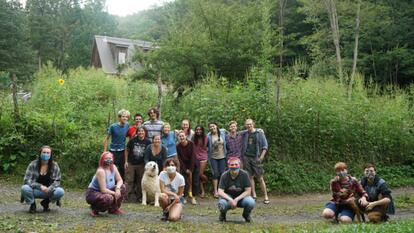Wellesley Student Writes for Global Magazine that Covers Human Rights Abuses

This summer, Nicole Ntim-Addae ’20, a neuroscience major from Accra, Ghana, is busy writing about human rights abuses in Honduras and freedom of the press in the United States for Index on Censorship, an award-winning magazine published by an organization of the same name. Her internship with the organization is supported by Wellesley’s Freedom Project.
Ntim-Addae’s first piece was about a news outlet in Honduras that was being targeted in retaliation for a story that showed the military in a negative light. She also co-wrote an article on a discussion on the topic of “the growing threats to press freedom in the United States” at London’s Free Word Centre featuring a panel of experts.
The Freedom Project partners with foundations, think tanks, and nongovernmental organizations to offer a variety of internships in the U.S. and abroad; in addition to Index on Censorship, participating organizations include the Oslo Scholars Program, the Pioneer Institute, and Scholars at Risk.
Index on Censorship is a prominent supporter of global efforts to protect freedom of expression. Its magazine is an outlet for writers, thinkers, and activists on this topic.
From London, where she is based during her internship, Ntim-Addae took a moment away from reporting to answer a few questions via email.
Q: What motivates your journalistic work exposing authoritarian human rights abuses?
A: Nicole Ntim-Addae: The world is not fair yet. I’ve yet to meet a person who doesn’t have an acute sense of justice. When people hear that something is going wrong, it motivates them to try and change it. Journalism reveals the underbelly of problems to the public, who demand that they be solved. When I write about human rights abuses, governments and/or advocacy groups try to change them either to save face or to help the less fortunate.
Q: How does the Index on Censorship internship connect to your studies at Wellesley?
A: Ntim-Addae: Ironically, it doesn’t connect directly to anything I am doing now. I am a neuroscience major with a minor in sociology on a pre-medicine path. I think that’s what I love most about it! It’s new, it’s more than academic study, and it pursues my personal interests. It’s exposure, character building, and resume building, all while allowing me to travel!
Q: What does this experience mean to you?
A: Ntim-Addae: This has been my best internship opportunity thus far. I never thought I’d have the opportunity to study anything outside my major fields, and had it not been for the Freedom Project, I would never had the opportunity to go. Not only was I able to publish multiple articles within a month of starting, I’ve met refugees, journalists, and advocates who widen my view of the world more than I ever thought possible.
Q: How is this work, and being a part of the Freedom Project, preparing you for what you hope to do after Wellesley?
A: Ntim-Addae: I am not a fellow of the Freedom Project, but I loved attending their talks and events. I took two classes with Professor [Thomas] Cushman, on global human rights and liberty and morality. Professor Cushman recommended that I apply, and here I am! I learned you should really utilize your professors – that's why they're there. This internship is teaching me how to say what I mean and mean what I say. Whatever I publish, I must stand behind, and to have that voice is liberating.
Q: Why do you think it is essential for Wellesley students to be globally engaged?
A: Ntim-Addae: Americans lead the pulse on a lot of things, but often fail to realize how that affects the rest of the world. Being Ghanaian and American, studying in both countries, and being exposed to England led me to understand how dangerous it is for anyone to stay in a bubble, even if that bubble is Wellesley. We must be aware of what other people think and why they think the way they do, otherwise we will never convince them that there is a better viewpoint.
Articles by Ntim-Addae thus far:
India: Love, Simon release indefinitely delayed
Honduras: False story seeks to discredit digital newspaper Reporteros de Investigacion
United States: Losing a point of reference: Press freedom in the US



